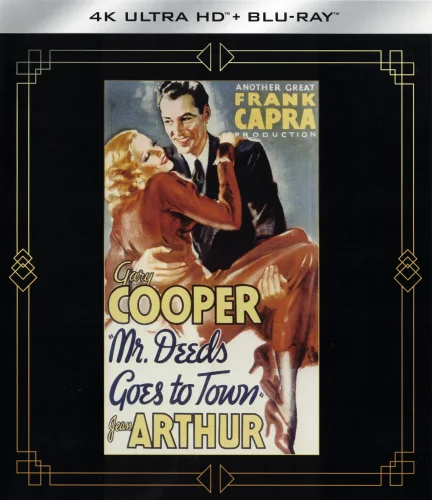Story Movie
Longfellow Deeds, a hillbilly from Vermont, inherits his uncle's vast fortune and overnight becomes nationally known. The whole town gathers at the train station to escort Deeds, a trumpet-playing poet, to New York, where he must take possession of his uncle's capital and move into a huge mansion.
The cynical newspaperman McWade does not believe in the image of a simple honest man created for Deeds in the press. He assigns the beautiful Babe Bennett to interview the guy and gives her unambiguous instructions.
The journalist pretends to faint at the entrance to the mansion. The gallant Deeds lifts her up in his arms, caring for her. She informs him that she is out of work and gradually begins to draw out information...
Review 4K Movie
Having watched, it would seem, all the sensational pictures of Frank Capra, I was pleasantly surprised to find one more untouched and watched “Mr. Deeds” with great pleasure. And became even more convinced that this director not only made wonderful comedies, but was also a true patriot.
Undoubtedly, “It's a Wonderful Life,” which became a classic and the peak of his career, as well as “Mr. Smith Goes to Washington” - in the full sense of the word examples of patriotic cinema. The same can be said of “Mr. Deeds.” After all, the parallelism of this picture with “Mr. Smith” is obvious. It is not without reason that for the second time Capra appeals to the voice of conscience and humanity, not only Americans, but all people. It is not without reason that his hero is again a young and naive idealist from the province, not familiar with the dirty and despicable games of the “powers that be” living in big cities, where his fate takes him. Longfellow Deeds is just such a simpleton who got into trouble - a huge pile of money fell on him in the form of an inheritance from an uncle he had never seen before, on which the vultures greedy for them immediately flew and dragged him into their nest. Of course, in their midst Deeds looks really a fool, even crazy, which is what envious people try to accuse him of in order to take away all the money. All his attempts to be a benefactor to the poor farmers fail miserably, and failure follows him everywhere. But trouble doesn't come alone. And it comes in the form of a charming and defenseless girl, in whom the simple and sincere Deeds-romantic and Deeds-dreamer falls in love at first sight. Alas, the girl turns out to be a burned-out careerist, a journalist, eager to grab the scoop and get a promotion and paid vacation from the editorial office.
But you should know Frank Capra, who manages to make this story not just a social and love drama, but an uplifting and deeply inspiring story about the struggle of a “little” man, who believes in the American Dream, with the entire bureaucratic layer of New York. Like Smith, Longfellow Deeds says simple, sometimes stupidly funny things, but they stop seeming that way once you realize that it is these stupid things that people lack to live happily. And though his soul is wide open, his open and somewhat harsh disposition of the village goodman at first leaves most people indifferent, gradually luck comes to his side - the girl-journalist still has a soul, and she hesitantly but surely wakes up and begins to admire Deeds and, finally, finally falls in love with him.
And although it is clear in advance what the end will be, the real pleasure comes every time to see the triumph and universal recognition of justice, a hard, but defeated and cheerful victory over narcissistic, money- and fame-hungry people, if you can call them that. Perhaps, this approach of the director would seem too naive and straightforward nowadays, and this movie is perceived, probably, as simple-minded speeches of Longfellow Deeds by New Yorkers. And, in my opinion, that's exactly how it should be - honest, straightforward and heartfelt, and also with good humor. And no matter how the methods of the main character of this picture look, it seems to me that it does not get old and cannot get old. Only if goodness and humanity fade away forever in the world, and people stop being human.
Besides these pathos praises, I would like to say something about the actors. To be honest, actors are usually praised very inarticulately, they say that they looked wonderful and organic in their roles and were, so to speak, in every way great. Essentially empty and sometimes undeserved words, which more often should be said to the director, but sometimes it is difficult to refrain from it. After all, good old America in movies is all about great and expressive actors, who may have been specially selected by the producers and director, but always produced a terrific effect. I think a lot of Hollywood movies of those times owe their success to them. And in “Mr. Deeds” we can not ignore the “tall and statuesque” handsome Gary Cooper, without whom, of course, would not have succeeded all the mess and fun. And a special attention should be paid to Jean Arthur - in my opinion, one of the most charming and inimitable in her image American actresses, who managed to leave a small but noticeable trace in the films of the same Frank Capra as his favorite actress. I am sure that “Mr. Smith” was equally a great success thanks to an equally wonderful couple in the person of Jean Arthur and James Stewart.
It seems odd that neither of these films won a major Oscar, and both only received one each, as indeed did “It's a Wonderful Life,” which received none at all. To the man who extolled justice, it was not given. Irony or not, Frank Capra is not a director without talent, and his contribution to cinema, I'm sure, will remain notable. And let Mr. Deeds Goes to Town be a good and clear example to prove my words.



 [/full-link]
[/full-link]
 [/full-link]
[/full-link]

 [/full-link]
[/full-link]
